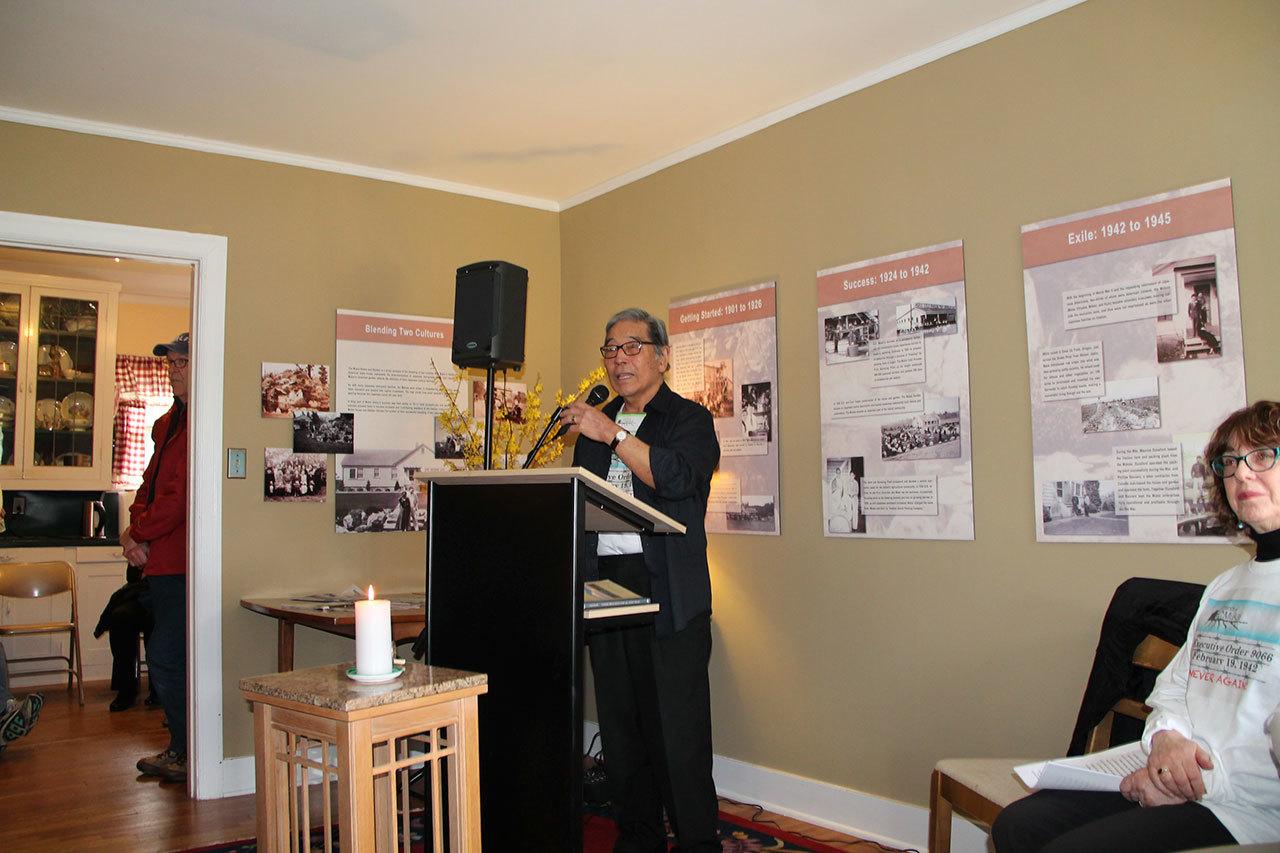An overflowing crowd filled the front room at the Mukai House and Garden on Sunday for a ceremony marking the 75th Anniversary of Executive Order 9066, which authorized the removal and incarceration of more than 120,000 Japanese-Americans on the West Coast.
The event, hosted by the Friends of Mukai, had five speakers, including two islanders who lived in the camps as young children: Joe Okimoto and Lonny Kaneko.
Friends of Mukai board member Okimoto opened the ceremony.
“Today, the Friends of Mukai want to remember this dark chapter in U.S. history and by lighting a ceremonial candle, symbolically dispel the darkness cast by this executive order,” he said.
Okimoto briefly recounted being imprisoned beginning at age 3. He lived in San Diego at the time of the order, and his mother was six months pregnant when soldiers escorted the family to a temporary prison — hastily converted horse stalls at the Santa Anita Race Track. His mother gave birth there to the family’s fourth child, and two weeks later, they were sent to the Poston War Relocation Center in Arizona, which held 18,000 people.
“We spent over three years in this desolate desert, and it was here, beneath the watchful eyes of guard towers and surrounded by barbed wire, that I began my educational career,” he said.
Many islanders are familiar with the story of Mary Matsuda Gruenewald, who was a Vashon teenager when she and her family — along with more than 100 other islanders — were sent to Tule Lake concentration camp in California. Helen Meeker read from Gruenewald’s book, “Looking Like the Enemy,” in which she recounts the story of her imprisonment.
“I yearn for the day when the American public will read, listen and understand the implications of what the United States did to Japanese-Americans — and what we must do differently and far better in today’s world torn by terrorism
and war,” Gruenewald wrote.
Islander Meredith Yasui, a third-generation Japanese-American, was out of town for the event, but provided her family’s painful story, which included suicide, imprisonment — and the Presidential Medal of Freedom in 2015, awarded posthumously, to her uncle Minoru Yasui.
Her words, too sounded a warning. “So never forget, the rights that protects us are the most fragile during times of civil stress,” she wrote.
Islander Yvonne Kuperberg also addressed those gathered, noting that she was a student at Tacoma’s Lincoln High School when many of her classmates inexplicably disappeared. Her teacher responded to questions with an inadequate answer. “They had to go away for a little while,” she told them.
Now, Kuperberg said, she is involved with the Friends of Mukai to try to make a difference in this time.
“Be sure to speak out. Take a stand,” she told those gathered.
The final speaker of the day was Lonny Kaneko, the island’s current poet laureate and a Vashon resident since 1982.
Living in Seattle at age 2, he and his family were sent to the Minidoka Concentration Camp in Idaho, where they lived for three years.
A writer, Kaneko has received national and local awards for his work, including his poetry. He read from his book, “Coming Home from Camp and Other Poems,” including this excerpt, titled “1942.”
The locomotive steams over names like Puyallup,
Boise, Twin Falls, and Burley; it heads
where men throw nails and two-by-fours
into desert air. They fall into long lines.
Soldiers empty the cars of names
like Naganawa, Namba, Hiroshige
and prod faces named George, Linc, or Naomi
into rooms furnished with sawdust and sage.
Following the event, Lynn Greiner, the president of the Friends of Mukai board, spoke to the importance of the gathering and the overall hopes the board has for the property.
“We see Mukai as a place to honor our history and to look at what was going on when the Mukais were on the island and to make it relevant today,” she said.
A lawyer, she too talked about historical parallels with President Donald Trump’s executive orders and talk of registries juxtaposed with the 75th anniversary of President Franklin Roosevelt’s Executive Order 9066.
“The event was a way to remember what happened,” she said.



